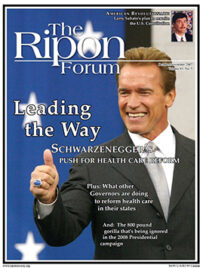
Health care reform is once again at the top of the nation’s political agenda. But in developing health policy, it is vital to keep in mind one pertinent fact: for all its problems, the United States offers the highest quality health care in the world.
Most of the world’s top doctors, hospitals, and research facilities are located in the United States. Seventeen of the last 25 winners of the Nobel Prize in Medicine either are U.S. citizens or work in this country. U.S. companies have developed half of all the major new medicines introduced worldwide over the past 20 years.
In fact, Americans played a key role in 80% of the most important medical advances of the past 30 years. Nearly every type of advanced medical technology or procedure is more available in the United States than in any other country. By almost any measure, if you are diagnosed with a serious illness, the United States is the place you want to be. That is why tens of thousands of patients from around the world come to this country every year for treatment.
Of course, critics of American health care often point out, other countries have higher life expectancies and lower infant mortality rates, but those two indicators are not a good way to measure the quality of a nation’s health care system. In the United States, very low-birth-weight infants have a much greater chance of being brought to term with the latest medical technologies. Some of those low-birth-weight babies die soon after birth, which boosts our infant mortality rate, but in many other Western countries, those high-risk, low-birth-weight infants are not included when infant mortality is calculated.
And life expectancy is a poor measure of a health care system. Life expectancies are affected by exogenous factors such as violent crime, poverty, obesity, tobacco and drug use, and other issues unrelated to health care. Consider the nearly three year disparity in life expectancy between Utah (78.7 years) and Nevada (75.9 years), despite the fact that they essentially have the same health care systems. In fact, these exogenous factors are so distorting that if you correct for homicides and accidents, the U.S. rises to the top of the list for life expectancy.
On the other hand, when you compare the outcome for specific diseases like cancer or heart disease, the United States clearly outperforms the rest of the world. Take prostate cancer, for example. Even though American men are more likely to be diagnosed with prostate cancer than their counterparts in other countries, they are less likely to die from the disease. Less than one out of five American men with prostate cancer will die from it, but 57% of British men and nearly half of French and German men will. Even in Canada, a quarter of men diagnosed with prostate cancer die from the disease.
…in developing health policy, it is vital to keep in mind one pertinent fact: for all its problems, the Untied States offers the highest quality health care in the world.
Similar results can be found for other forms of cancer. For instance, just 30% of U.S. citizens diagnosed with colon cancer die from it, compared to fully 74 percent in Britain, 62% in New Zealand, 58% in France, 57% in Germany, 53% in Australia, and 36% in Canada. Similarly, less than 25% of U.S. women die from breast cancer, but 46% of British women, 35% of French women, 31% of German women, 28% of Canadian women, 28% of Australian women, and 46% of women from New Zealand die from it.
The same U.S. advantage can be found for outcomes with other diseases, ranging from AIDS to heart disease. This should not be surprising. The one common characteristic of all national health care systems is that they ration care. Sometimes they ration it explicitly, denying certain types of treatment altogether. More often, they ration more indirectly, imposing global budgets or other cost constraints that limit the availability of high-tech medical equipment or imposing long waits on patients seeking treatment.
For example, more than 750,000 Britons are waiting for admission to National Health Service hospitals at any given time, and shortages force the NHS to cancel as many as 50,000 operations each year. Roughly 90,000 New Zealanders are facing similar waits. In Sweden, the wait for heart surgery can be as long as 25 weeks, while the average wait for hip replacement surgery is more than a year.
And, in Canada more than 800,000 patients are currently on waiting lists for medical procedures. A study in the Canadian Medical Association Journal found that at least 50 patients in Ontario alone have died while on the waiting list for cardiac catheterization. And Canadian Supreme Court Chief Justice Beverly McLachlin wrote in a 2005 decision striking down part of Canada’s universal care law, that many Canadians waiting for treatment suffer chronic pain and that “patients die while on the waiting list.”
Obviously, there are problems with the U.S. system. Too many Americans lack health insurance and/or are unable to afford the best care. More must be done to lower health care costs and increase access to care. Both patients and providers need better and more useful information. The system is riddled with waste, and quality of care is uneven. Government health care programs like Medicare and Medicaid threaten future generations with an enormous burden of debt and taxes. Health care reform is not a choice, but a necessity.
But in pursuing reform, we should be guided by the Hippocratic Oath: First, do no harm. We should make very certain that the cure is not worse than the disease.
We must do nothing to undermine the free-market health care system that gives us the world’s best care.
Michael Tanner is the Director of Health and Welfare Studies at the Cato Institute.




